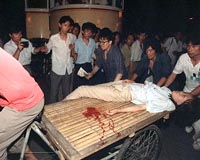 |
Beijing (AFP) June 2, 2009 Twenty years ago, they were young and eager, and thought their bold demonstrations in the heart of Beijing would change China. Now entering middle age, many of the former Tiananmen protesters still believe they can make a difference, but now it is by using their skills as businessmen to contribute to China's economy, and avoiding any confrontation with the state. "There are some internal strengths that have propelled our success, be it ideology or be it personal character or experience," said one of them, a senior executive who asked not to be named to avoid repercussions for his business. "I think the government has benefited tremendously. As a matter of fact, a lot of middle-level or senior-level people have implemented a lot of change over the last 10 to 20 years." The Tiananmen generation has developed in different ways after the shock dealt on June 4, 1989 when the Chinese government sent tanks and soldiers to crush seven weeks of pro-democracy protests, killing hundreds if not thousands. A large majority has integrated into society as a whole, but some have stayed on the sidelines, remaining true to the ideals of democracy and transparency advocated during the 1989 protests. But even this minority does not necessarily reject the values of those that have now turned into pillars of society. "If they can manage being a successful merchant and are willing to accept certain conditions, I totally understand," said Wu'er Kaixi, a former student leader who is now a Taiwan-based investment banker. "Being a dissident is not a job for hundreds of thousands of people to fill. Being successful is a task for the whole generation." Many former members of the Tiananmen movement readily admit that the China they spoke up against in 1989 is very different from today's society, even if they also point out flaws. "People are better off, not only economically, but also politically. Twenty years ago, there was no way of monitoring the government. Today government efficiency is much better than before," said the business executive. "The change I'd like to see is probably more political freedom and freedom of the press. Those eventually will help China release its brain power. If you have errors, but can't talk about them, you can't see things clearly." In the months and years after the 1989 crackdown, leaders of the student movement went on the run from a vindictive regime, and many fled abroad. But as China's economy picked up in the 1990s at a faster speed than anyone had imagined, a growing number were tempted to return home and throw in their lot with the nation's authoritarian, market-loving rulers. "The pull, of course, is that the intellectuals, including the students, from a material point of view have a much better life now," said Perry Link, the US-based co-editor of "The Tiananmen Papers," a collection of allegedly secret documents from 1989. The government, eager to reverse a brain drain sapping China of talent, has welcomed them back, but the former students know that they are virtually sworn to silence about the momentous events of 20 years ago. "Even if they lived through the years, people are reluctant to speak about it with each other, just because it's a radioactive thing politically that could hurt them," said Link, who teaches at the University of California, Riverside. "Some are making the peace with the current regime on the surface, but underneath they are still remembering." Despite all the perks associated with the membership of China's new business elite, many carry painful memories from two decades ago and criticise the government for not facing up to the truth. "The government made some serious mistakes in dealing with this event. It was totally wrong. You can't justify that. It was just wrong," said the protester-turned-executive. "No matter how long it takes, justice will be served to history. It doesn't matter if it takes 20 years, 50 years or even 200 years. But the sooner, the better." Share This Article With Planet Earth
Related Links China News from SinoDaily.com
 Tiananmen: A bereaved mother's never-ending pain
Tiananmen: A bereaved mother's never-ending painBeijing (AFP) June 2, 2009 Twenty years on, Ding Zilin's pain is still as raw as it was when her son was shot through the heart in the army crackdown on Tiananmen Square protesters in China -- an event that she says broke her. Jiang Jielian, 17, had been a keen participant in the seven weeks of pro-democracy demonstrations in Beijing in the spring of 1989 and, ignoring a curfew imposed by Ding on the evening of June 3 ... read more |
|
| The content herein, unless otherwise known to be public domain, are Copyright 1995-2009 - SpaceDaily. AFP and UPI Wire Stories are copyright Agence France-Presse and United Press International. ESA Portal Reports are copyright European Space Agency. All NASA sourced material is public domain. Additional copyrights may apply in whole or part to other bona fide parties. Advertising does not imply endorsement,agreement or approval of any opinions, statements or information provided by SpaceDaily on any Web page published or hosted by SpaceDaily. Privacy Statement |